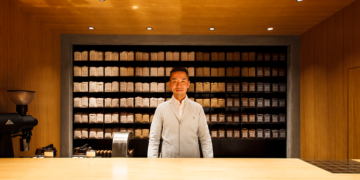
As I sit down with Wasim Miah, co-founder and CEO of the London-based startup Spark, it becomes evident that his mission extends beyond building your typical startup — he’s driving a quiet revolution in ethical finance. In a world where consumption drives industries, Wasim is reshaping how we think about price comparison, ethical consumption, and sustainable finance with his innovative platform, Spark.
What is Spark?
Spark is a groundbreaking price comparison platform that goes beyond traditional metrics to include transparency, sustainability, and ethical considerations. With Spark, consumers can:
- Easily compare and purchase ethical financial products and services.
- Access vetted providers adhering to high environmental, social, and governance (ESG) standards.
- Track their financial spend across mortgages, insurance, and utilities in one place.
- Align their financial decisions with values like sustainability, faith-based principles and social responsibility.
Spark stands out for its innovative approach to making ethical finance accessible and understandable for the everyday consumer. By providing clear, concise comparisons and simplifying complex financial jargon, Spark empowers individuals to make well-informed financial decisions that align with their unique lifestyles and values. Beyond this, Spark integrates a distinctive educational component, providing users with insights and guidance on ethical consumption to help them understand the broader impact of their financial choices.
The platform also distinguishes itself by offering faith-based financial products that cater to the needs of diverse communities. These include interest-free mortgages and Sharia-compliant investments, reflecting Spark’s dedication to inclusivity and adherence to religious principles.
Building on this commitment, Spark goes beyond conventional finance platforms by integrating the principles of ethical finance. It avoids investments in harmful industries like weapons and gambling, instead prioritizing sectors that promote societal and environmental well-being. Examples include ethical consumer businesses that emphasize fair labor practices, sustainable materials, and supply chain transparency, as well as social enterprises focused on community development, fair trade, and job creation in underserved areas.
The Vision Behind Spark
“The idea for Spark emerged from Wasim’s profound sense of helplessness in confronting the world’s challenges, sparking his determination to create a platform that empowers individuals to drive meaningful, values-based change. ‘I realized the power of the collective,’ Wasim shares. ‘When people unite in making ethical choices, the collective impact can be transformative, often reshaping society for the better.” His discovery of Islamic banking principles — such as non-interest loans and investments that avoid unethical industries — further motivated him to design a platform that bridges faith-based finance with ethical consumption.
With 80% of UK consumers already using price comparison sites, Wasim saw an opportunity to address the gap in ethical and faith-aligned financial options. Recognizing the growing demand for transparency and values-driven decision-making, he envisioned a platform that not only simplifies financial choices but also empowers users to align their decisions with their personal beliefs and principles.
Bridging Ethical and Faith-Based Finance
Islamic finance has experienced strong growth over the past two decades, with assets valued at nearly $3 trillion as of 2024 and an expected CAGR of 5% through 2025. Recent projections estimate market growth at 10-12% between 2024 and 2027, driven by rising demand for Sharia-compliant financial products, global interest in ethical finance, and increasing Muslim populations. Among the fastest-growing segments are Sukuk (Islamic bonds), which have historically achieved a CAGR of over 15%. This growth is concentrated in key regions such as the Middle East, Southeast Asia, and South Asia, with emerging interest in non-Muslim-majority countries like the UK and parts of Africa.
Ethical and faith-based finance often overlap but have distinct goals. Spark bridges this nuance by offering products like interest-free mortgages and socially responsible investment funds, catering to diverse communities while ensuring transparency and affordability. The platform also aims to debunk myths, such as the so-called “Muslim tax” — the misconception that faith-based financial products come with hidden, higher fees.
The demand for Sharia-compliant financial products is particularly strong among younger, ethically driven consumers. A report by Mambu reveals that 85% of Gen Z Muslims are interested in exploring Islamic banking. However, the push for ethical financial choices is not limited to the Muslim community. Increasingly, consumers are scrutinizing where their money goes, with 60% expressing distrust in companies’ ethical claims due to concerns over greenwashing and misleading practices. Notably, 30% of consumers have stopped supporting brands or products over sustainability-related issues, underscoring the rising demand for transparency and accountability.
Sustainability at the Core
Sustainability isn’t just a buzzword for Spark; it’s a core principle. The platform features:
- Providers with strong ESG practices.
- Green energy suppliers alongside financial services, ensuring that every product aligns with Spark’s broader vision for a sustainable future.
- Mechanisms to evaluate providers’ sustainability claims, countering the prevalence of greenwashing in today’s market.
Despite the ongoing cost-of-living crisis, ethical shopping in the UK is on the rise, as reported by The Guardian. Consumers are increasingly prioritizing values like sustainability and transparency, which aligns perfectly with Spark’s mission. The Ethical Consumer Markets Report further reinforces this trend, noting that ethical spending in the UK has surpassed £87 billion annually, indicating a sustained shift toward conscious consumerism.
A Unique Value Proposition
What sets Spark apart is its multifaceted approach to price comparison. Transparency is a cornerstone: the platform simplifies complex financial information, making it accessible to everyday consumers.
Unlike traditional platforms, Spark integrates tracking tools, empowering users to monitor and optimize their financial decisions. Looking ahead, Spark plans to AI technology for dynamic price monitoring to perfect product comparison for consumers.
Challenges and Opportunities
While Spark is still in the development stage, it has faced its share of challenges. From designing a robust wireframe to building an audience, scaling the platform demands a delicate balance between profitability and purpose. Nevertheless, Wasim remains optimistic, recognizing the immense potential as consumers grow increasingly conscious of the impact of their financial choices.
“We’re witnessing a shift,” he notes. “More people want to allocate their money to industries that align with their values, from renewable energy, electric vehicles and other ethically produced consumer goods.” To meet this growing demand, Spark is focused on refining its user experience, forging partnerships with ethical financial institutions, and educating users on the broader implications of their financial decisions.
Spark’s ambition is to become the go-to financial marketplace for sustainability and ethical finance, eventually expanding into areas like sustainable travel. By staying at the forefront of emerging trends and adapting to the evolving needs of conscious consumers, Spark aims to not only scale its impact but also redefine the standard for ethical finance platforms.
The Path Forward
For Wasim, Spark represents more than a business — it’s a movement. By empowering consumers with tools and knowledge, Spark is contributing to a broader societal shift toward ethical consumption and sustainable living. The platform’s vision for the future includes expanding into new markets, developing partnerships, and fostering financial literacy to help individuals build ethical portfolios from a young age.
It’s easy to look at a product in a grocery store and see where it comes from, yet we don’t have the same level of transparency with financial products. Spark aims to change that by bringing clarity to the often opaque world of finance, helping people understand exactly where their money is going and the impact it has.
Final Thoughts
Spark is more than a price comparison platform — it’s a catalyst for change, fostering a community of conscious consumers who recognize the power of their financial choices. Wasim’s journey as a startup founder underscores the importance of transparency, education, and purpose-driven innovation in addressing some of the world’s most pressing challenges.
As Spark continues to grow, it exemplifies how businesses can align profitability with values, proving that ethical and sustainable practices are not just good principles—they’re essential for shaping a better future. By empowering individuals to take control of their financial decisions and align them with their beliefs, Spark is lighting the way toward a world where every choice matters.
For anyone ready to take the first step toward ethical consumption, Spark offers a clear path forward. It’s a testament to the idea that small, intentional changes can drive monumental shifts, inspiring others to join in reshaping the financial landscape for generations to come.
Stay Updated with Spark
Be among the first to experience the future of ethical finance as Spark launches in new regions. Join thousands already on their waitlist, ready to take control of their spending and make a difference.
Sign up now: www.sparkethical.com







